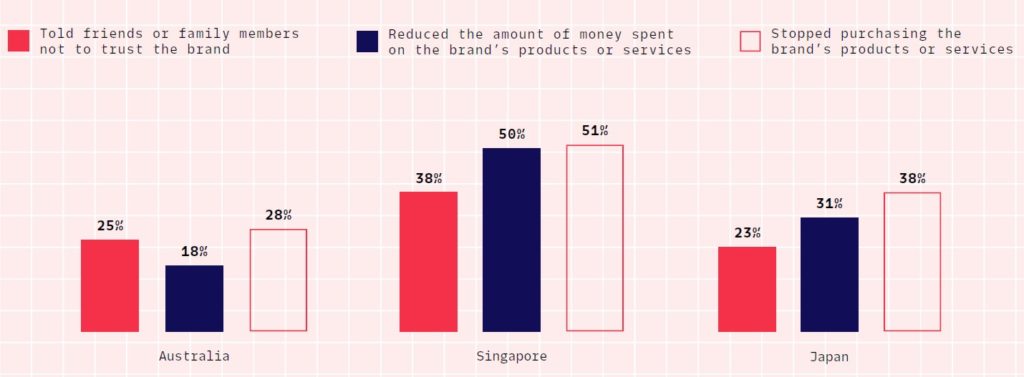Twilio’s (third annual State of Customer Engagement Report found that investment in digital customer engagement and personalisation technologies has had a significant positive impact on customer retention and trust — and on revenues.
In Singapore, for instance, B2C companies that invested in digital customer engagement also saw an average increase in total revenue of 61%.
The cookie clock is ticking
Third-party cookies, which are now blocked by Firefox and Safari, will also be blocked by Google Chrome by the end of 2023. Businesses need to prepare quickly for these upcoming changes, especially as 88% of Singaporean consumers prefer for brands to make use of only first-party data when delivering personalised experiences.
The deprecation of cookies will cause even more difficulty for brands who rely on such cookies to identify and track visitors to their websites. 73% of B2C companies in Singapore surveyed rely on third-party data for their current marketing strategies. In addition, nearly 2 out of 3 (65%) companies in Singapore say they are not fully prepared for a cookieless world.
This means that when a key pillar of the advertising- and social media-driven internet disappears, collecting and relying on first-party data won’t just be a competitive advantage anymore – it will be table stakes for survival.
Personalisation: expectations vs. reality
Personalisation has emerged as one of the most important aspects of delivering a competitive brand experience that will attract customers and create brand loyalty. In fact, the consequences of not providing personalised experiences to customers can be severe, especially as consumers in Singapore tend to expect personalised experiences compared to other countries. 81% of consumers in Singapore say they’ll stop using a brand if it doesn’t personalise their experience, compared to the global average of 61%.
However, while both brands and consumers agree that personalisation is important, the report uncovered some startling gaps.

Source: State of Customer Engagement Report, Twilio 2022
For instance, most companies in Singapore (90%) surveyed believe that personalisation is critical to their customer engagement strategy. Yet while 75% of companies claim to provide good or excellent personalised experiences to customers, more than half of consumers (53%) disagree, reporting bad, poor or average personalisation.
Fundamentals to ensure digital survival and success

Lee Hawksley, senior vice president and general manager, Asia-Pacific and Japan at Twilio says personalisation is actually getting harder to deliver, with high customer expectations, changing technologies, and the diminishing value of third-party cookies.
“We’ve seen five fundamentals to overcoming these challenges: embrace digital, personalise every interaction, shift to first-party data, close the trust gap, and avoid engagement fatigue by increasing the quality of your interactions,” he added.
Key findings:
Digital customer engagement drives major return on investment
- 97% of B2C companies in Singapore saw an increase in revenue as a result of investments in digital customer engagement.
- 28% of B2C companies in Singapore surveyed expect to at least double their digital customer engagement investment by 2025.
Personalisation is critical for consumers in Singapore, and they want companies to do better
- 81% of consumers in Singapore say they’ll stop using a brand if it doesn’t personalise their experience, compared to the global average of 61%.
- 75% of B2C companies in Singapore believe they provide good or excellent personalised customer experiences, 53% of consumers in Singapore disagree.
Brands need to adapt to a cookieless era
- 88% of consumers in Singapore prefer for brands not to use third-party data.
- 73% of B2C companies in Singapore rely on third-party data for their current marketing strategies.
- Only 35% of B2C companies in Singapore feel fully prepared for the shift away from third-party cookies.
The trust gap between consumers and businesses is putting customer loyalty at risk
- 54% of consumers in Singapore want brands to do more to protect their privacy and be transparent about data usage.
- Consumers in Singapore are acting against brands that do not meet their data privacy expectations
- 51% of respondents stopped purchasing the brand’s products or services
- 50% of respondents reduced the amount of money spent on the brand’s products or services
• 38% of respondents told friends or family members not to trust the brand
Digital fatigue is real and a growing problem
- 65% of consumers in Singapore are frustrated with inconsistent digital interactions with brands
- Top three reasons why consumers in Singapore will stop doing business with a company:
- Not being able to connect with someone from customer support (16%)
- Knowing another company will provide a better customer experience (15%)
- Being transferred multiple times to different service representatives (12%)




